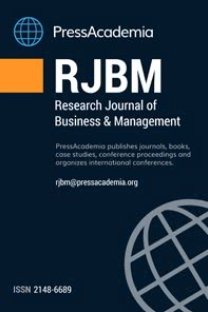ACCOUNTING EDUCATION AT FACULTY OF ECONOMIC ADMINISTRATIVE SCIENCE IN KYRGYZSTAN UNIVERSITIES AND EXPECTATION OF STUDENTS FROM ACCOUNTING EDUCATION, A CASE STUDY IN BISHKEK
Rapid changes in the application of enterprise has had a dominant effect on accounting education in the globalized world. While the continuous and rapidly changing process, it is becoming more important for the financial statement users to obtain true and trustworthy knowledge from accounting education at the university level. The financial language of accounting must be adopted as part of these changes. Accounting must produce true and trustworthy knowledge for the enterprises. There is a lot of effectiveness to increase the efficiency of accounting education for graduate. However, firstly, it must meet the needs of learners, and the effectiveness of accounting education should be evaluated. The results of this research must be used to redesign accounting education; this is crucial for improving the effectiveness of accounting education. Accounting education reform should take into account the needs and applications of the accounting occupation. Theory and application are linked, so old knowledge and new knowledge must be synthesized.
___
- Ahmed, Karman, Kazi Firoz Alam and Manzurul Alam, (1997), “An EmpiricalStudy Of FactorsAffecting Accounting
- Students’careerChoice in New Zealand”, Accounting Education, 6(4), 325-335
- Albrecht, W. S. ve Sack, R.J. (2012); “Accounting Education: Chartingthe Course Through a PerilousFuture”, http://aaahq.org/pubs/AESv16/toc.htm 11/01/2012
- Bayazıtlı, Ercan ve Orhan Chelik (2004); “ The First Step in Improving the Quality of Education : Analysis of
- Effectiveness of the Accounting Education in High Educational Institutes”, Accounting Education Symposium in Turkey, http:// www. isletme.istanbul.edu.tr/ surekli_ yayinlar/ tmes2004/ tmes_2004.pdf
- Boyd, D.,Boyd, S. ve Boyd W. (2000); “Changes in Accounting Education: ImprovingPrinciples Content forBetterUnderstanding”, Journal of Educationfor Business, 76, 1: 36-42.
- Byrne, Marann and Pauline Willis, (2005), “IrishSecondaryStudents’ Perceptions of theWork of an
- Accountantandthe Accounting Profession”, Accounting Education; an internationalJournal, Vol.14, No.4, p. 367- 3
- Cukaci, Yusuf Cahit and Ismail Elagoz(2006); “Revelation Relationship Between Teaching Methods and Studying
- Styles Used in the Accounting Lessons and An Application in the Faculty of Economic and Management Sciences of Dokuz Eylul University ”, The Juornal of D.E.Ü.,İ.İ.B.F, Issue 21, Number 1, pages147-164
- Danziger, Nira, and Yoram Eden, (2006), “StudentCareerAspiratonsandPerceptions: The Case of Israeli
- Accounting Students”, Accounting Education:aninternationalJournal, Vol.15, No.2, p.113-134
- Demir, M and M. Çam, (2006), “ A Study Related to Factors Affecting Adversely the Student’s Success of
- Accounting Faculty in Learning Accounting” Journal of Accounting and Finance (JAAF), Issue:32, p.160-169. Gökçen, G. (1998);“ Practitioners’ expectations for Accounting Education ” MarmaraUniversity, Journal of
- Accounting Research and the Central Accounting Finance, Issue 9, December, p.43 Haftacı, V. (2008); Management Accounting, Enlarged, Issue 3, Umuttepe Press, Kocaeli, p.12
- Kalmış, Halis and Berna Burcu Yılmaz (2004); “Current State of Undergraduate Level Accounting Education and Necessary Progress to be Developed”, Symposium on Accounting Education in Turkey, http:// www. isletme.istanbul.edu.tr/ surekli_ yayinlar/tmes2004/tmes_2004.pdf
- Köse, Tunç (2007); “Yönetim Muhasebesinde Değişim ve Yönetim. Muhasebesi Eğitiminin İncelenmesi”. Afyon
- Kocatepe Üniversitesi, İ.İ.B.F. Dergisi (C. IX ,S.1). 215. Kose, Tunch (2007); “Changing and Management in
- Management of Accounting, Investigating Accounting Education” Afyon Kocatepe University, the Journal of İ.İ.B.F.(N. IX, p.1). 215 Mohammed E., K. A. And Lashine, S.H. (2003); “Accounting Knowledge and Skills and the Challenges of a Global
- Business Environment”, Managerial Finance; Isue.29, Volume.7: p.4. Oncu, Semra ve Huseyin Aktaş (2004); “Standards of International Accounting Education”, Symposium on
- Accounting Education in Turkey, http:// www. isletme.istanbul.edu.tr/ surekli_ yayinlar/ tmes2004/ tmes_2004.pdf
- Paksoy, H. Mustafa, and the others.,(2005), “ Studying Adequacy of Accounting Education in Vocational Schools in the case of Harran University and Evaluation directed at Future.”, Journal of OVERVIEW Accounting and Auditing, Issue15, year:5, p.74
- Surmeli, Fevzi and Others. (2001).Accounting Information System, Eskisehir: Anadolu University, Fakulty of
- Tuition by Correspondence Press No:532, p.50-51. Yucel, Goksel (2004); “The Role of Teachers in Increasing the Quality of Accounting Education”, Symposium on
- Accounting Education of Turkey, http:// www. isletme.istanbul.edu.tr/ surekli_ yayinlar/ tmes2004/ tmes_2004.pdf
- Zaif, Figen (2004); “New Perspectives in Accounting Education”, Accounting Education Symposium in Turkey, http:// www. isletme.istanbul.edu.tr/ surekli_ yayinlar/ tmes2004/ tmes_2004.pdf
- Zaif, Figen and Yildiz Ayanoglu (2007); the Importance of the Education Program in Improvement of Quality in
- Accounting Management: A Study in Turkey”. The Journal of the Faculty of Economic and Management Sciences of Gazi University 9/1 (2007)
- Yayın Aralığı: Yılda 4 Sayı
- Başlangıç: 2014
- Yayıncı: PressAcademia
